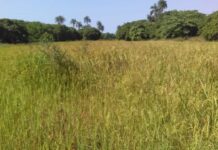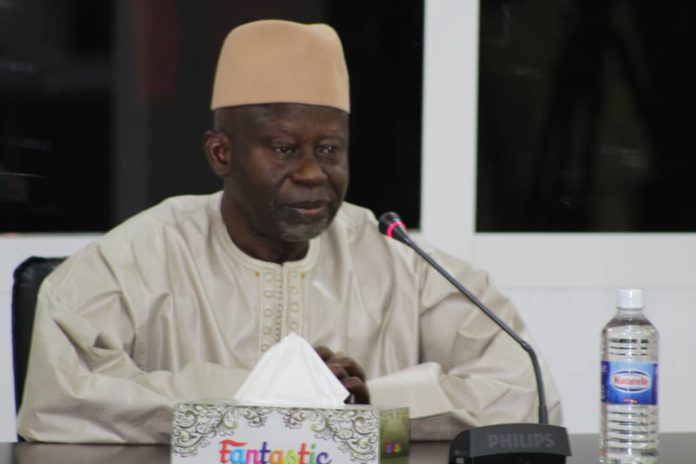By Yankuba Jallow
Lawyer Abubacar NM Ousainou Darboe, the party leader of the United Democratic Party (UDP) has told the TRRC that he went into hideout from 22nd to 26th July 1994, after the military junta overthrew the PPP government.
Darboe on Monday, 10th June 2019 gave testimony before the Truth, Reconciliation and Reparations Commission (TRRC) as the first witness of the fifth session of the TRRC.
He said on that day, he was in his law office (chambers) the first time he heard the news, but he couldn’t believe in the information. He said he came to accept the reality at the Denton Bridge when he was stopped by soldiers who searched his vehicle and he was allowed to pass after the search.
“I went home and took precautions for my personal safety because I have lived/studied in a country that was ruled by the military and they could behave in any way. I have seen in Nigeria how the military treated important people in ways that no one can imagine. I thought it could also happen here so I kept indoors,” he said.
“What precautions did you take for your personal safety?” Essa M. Faal, the Lead Counsel for the TRRC asked.
“I made sure I did not go out and on Saturday, I changed my place of abode because some soldiers came to my house and asked for me. I told them that I wasn’t in. so I had to leave the house in Pipeline to Kanifing to a sister, Nyanga Njie and lived with her until Tuesday or so when the situation was calm,” he said.
“Do you know why the soldiers were looking for you?” the Counsel asked.
In his reply, Darboe said the AFPRC wanted his services to promulgate their laws- decrees.
He said during the July 22nd coup, he was the vice president of the Gambia Bar Association. He said they wrote to the military government under the chairmanship of ex-Captain Yahya Jammeh (as he then was) asking them to hand over power to a civilian rule in six months. He added that this letter was not appreciated by the Council (AFPRC). He said he led a group of legal practitioners that opposed the celebration of the Legal Year 1994. He said they believed that as legal practitioners, men in uniform shouldn’t address them and talk to them about the rule of law.
He said the GBA, on the day of the swearing-in ceremony of the Attorney General, Hon. Idrissa Fafa Mba’I reiterated their position that the Council should hand over power to the civilian. He said it was in that meeting the ex-Captain Edward Singhatey called on them to advise them whenever they (the GBA) see the government going wrong.
He gave a rundown of arrests, torture and detention of UDP supporters by the APRC government wherein some of them got disappeared while under the custody of the State. He adduced that some of them died as a consequence of the cruel torture meted on them by security agents most especially, the NIA. Darboe’s testimony was mainly about the victimization of UDP supporters in the reign of the APRC.
About the October 1995 Alleged PPP Demonstration
Darboe, a one-time vice president of the Coalition government said he was not aware of any planned demonstration that was supposed to be staged by anyone. He said he was called by Mr. Daba Marenah, an operative agent of the National Intelligence Agency (NIA) to report to the Bakau Police Station but he refused the request because he hasn’t committed any crimes. He said he was persuaded by a brother of his, Lamin Jobarteh who was a senior police prosecutor to report himself to avoid facing brutal arrest by State Guard soldiers. He said he reported to the Fajara Barracks where he was detained for 23 to 24 days without any charges been pressed on him. He said he was detained along with PPP supporters who were alleged to have been planning to stage a demonstration at the American Embassy. He described the condition of the PPP militants and their leadership as terrible.
“I was the only one who was lucky not to be subjected to physical torture,” he said.
Darboe said he was questioned at the Fajara Barracks about the telephone conversation between MC Cham and Sir Dawda K. Jawara, an ex-President of the Gambia. He said he was asked to make a statement after which, he was detained at the Hanger inside the Barracks.
He said every morning Corporal Alagie Kanyi would come to the Hanger and taunt him using words that are geared towards making him feel inferior to him.
He said while at the Hanger, they were not allowed to change clothes or bath, adding that they were sleeping on the floor. He added that he attracted infection on his body because he didn’t take bath for a long time.
The Release of Arrested PPP Militants
He said the release of the PPP militants came after the UDP made it a condition that the PPP militants detained at the Fajara Barracks must be released or else they will boycott the 1997 National Assembly election. He said the government released them afterwards because the APRC wouldn’t have afforded the international pressure because they rigged the presidential elections.
He denied the suggestion that the intervention of the Imam Ratib of Banjul and other religious leaders resulted to the release of the PPP militants. This was the position of Lieutenant Colonel Baboucar Jatta, the head of the Fajara Barracks. For Darboe, he said this isn’t feasible.
“These people were released as a result of political pressure,” Darboe stated.
The Formation of UDP
Darboe said he was called by someone while he was in the USA that he will be made the UDP leader. He said accepting this position at that time was too challenging for him because the environment wasn’t favourable.
“My joining politics wasn’t designed. It was a difficult decision to make because of the situation of the country at that time. The environment was hostile,” Darboe said, adding that ex-President Yahya Jammeh did not want to have an opposition that will shake his political ambition so that he can have an easy ride.
He said after taking the difficult decision of being the leader of the opposition UDP, the party was launched in Banjul. He said it was supposed to have been launched in Brikama but due to personal security reasons, the venue was changed to Banjul.
About the 1996 Presidential Elections
He said the 1996 elections were flawed.
He said during the campaign, his party supporters were assaulted by the APRC supporters on several occasions as well some of the strong persons of the party were arrested and detained while the campaign was ongoing. He said the APRC delayed their campaign so as to intimidate UDP in areas that they were supposed to hold meetings.
He said on the 22nd September 1996, the UDP was supposed to hold a meeting in Banjul. He said on their way to Banjul, there was an ambush staged at the Denton Bridge by soldiers who in turn arrested and tortured UDP militants in the campaign team. He said he was told Yankuba Touray and Edward Singhatey were there at the time of the torture of his party supporters.
“I was about 200 metres from them and I made a u-turn to my house in Pipeline because I was their principal target. Yankuba Touray did say when I return from the provinces, I will be burnt,” he said.
He indicated that Yankuba Touray was the mobiliser for the APRC campaign. Darboe gave a rundown of some arrests of UDP militants with the sole aim of intimidating UDP supporters.
He said because of this incident, the UDP couldn’t complete their campaign tour in the remaining areas. He told the TRRC that they tabled complaint at the PIEC about the torture of their people but nothing was done about it. He said Amadou Sanneh and Amadou Dibba were arrested and were subjected to cruel torture.
Lawyer Darboe told the Commission that after the Presidential elections, the UDP embarked on a tour in the Upper River Division. Darboe adduced that the APRC entourage had in their vehicles machetes, stones among others. He denied that Mr Njie was murdered by his entourage. He explained that there was a community they reached in the URD where the UDP entourage was attacked by the APRC supporters throwing stones at them.
“My driver acted quickly and made a U-turn,” he said.
He indicated that one APRC supporter; Mr. Njie was allegedly murdered during the clash between the two party supporters. He denied having knowledge of the murder of the late APRC supporter although he and the UDP leadership except Kemeseng Jammeh were all prosecuted for murdering Mr. Njie. He admitted that his party supporters did burn a government vehicle that was been used by the APRC during the campaign. He denied the Lead Counsel’s suggestion that this man could have been killed by his entourage.
“Why don’t you investigate the murder of Mr. Njie?” the Lead Counsel asked.
“I was not under any legal obligation to investigate his death,” Lawyer Darboe replied.
“You told this Commission that your supporters were attacked at Westfield on the 22nd September and that the attack could have only come from the APRC. So are you are suggesting that the APRC supporters killed Mr. Njie?” the Lead Counsel put it to Lawyer Darboe.
In his reply he said UDP is a party of peace and that they did not murder Mr. Njie.
He said the APRC people where the ones who assaulted his entourage and that his party is a violent free party. He said after the alleged murder of Mr. Njie, he and the leadership were put in a truck from Basse to Kombo and charged for murdering the alleged deceased.
While admitting that the UDP supporters burnt a vehicle of the APRC campaign team, he argued that the vehicle was an instrument of crime used during the ambush by the APRC. He sounded that the UDP have all right to stop them (the APRC).
He said he alongside other UDP executive members were arrested and charged with the murder of on Mr. Njie, a supporter of APRC. He said they denied taking plea because they were arraigned before a court that does not have the jurisdiction to hear the case. He said they were granted a high court bail. He said after six-year trial, the case was thrown out on 22nd June 2006 after his Lawyers made a ‘no case submission’ because it lacked merit.
Background
He said he was born in 1948 in Basang village in the Central River Region (CRR). He said he attended Basang Primary School, St. Augustine Secondary School and Gambia High School. The senior lawyer told the TRRC that he has worked at the Ministry of Justice for seven years and in the year 1980 he went into private legal practice.


















